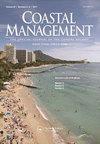纳拉甘塞特湾寻求基于生态系统的管理:以前的模型综述和未来研究路线图
IF 1.9
4区 环境科学与生态学
Q4 ENVIRONMENTAL SCIENCES
引用次数: 1
摘要
摘要生态系统模型已成为评估管理战略的重要工具,并越来越多地被决策者使用。我们回顾了建模的历史,并根据纳拉甘塞特湾(美国RI)基于生态系统管理的政策需求确定了研究差距。纳拉甘赛特湾是一个受影响严重的系统,其研究和监测历史可追溯到20世纪50年代。有必要理清营养减少与气候变化对物种相互作用的影响,并了解管理行动的生态和社会经济权衡。在这种背景下,我们认为以下内容对纳拉甘塞特湾生态系统模型的未来研究和创建很重要:(i)通过双向模型耦合说明多尺度过程和模式;(ii)将人类行为作为模型预测的一部分;以及(iii)通过确定强有力的管理战略来减少模型不确定性的影响,这些战略将在一系列潜在的未来情景下维持资源。基于先前模型并根据知识差距进行的生态系统建模将是在纳拉甘塞特湾和全球实施基于生态系统的管理的有力工具,为自然和人类提供可持续的途径。本文章由计算机程序翻译,如有差异,请以英文原文为准。
In Pursuit of Ecosystem-Based Management for Narragansett Bay: An Overview of Previous Models and Roadmap for Future Research
Abstract Ecosystem models have emerged as vital tools for evaluating management strategies and are increasingly used by policymakers. We reviewed the history of modeling and identified research gaps based on policy needs for ecosystem-based management of Narragansett Bay (RI, USA)—a highly-impacted system with a history of research and monitoring dating back to the 1950s. There is a need to disentangle the impacts of nutrient reductions versus climate change on species interactions as well as understand the ecological and socio-economic tradeoffs of management actions. Within this context, we consider the following to be important for future research and creation of ecosystem models for Narragansett Bay: (i) account for multi-scale processes and patterns through two-way model coupling; (ii) incorporate human behavior as part of model predictions; and (iii) lessen the impact of model uncertainty by identifying robust management strategies that will sustain resources under a range of potential future scenarios. Ecosystem modeling that builds on prior models and is informed by knowledge gaps will be a powerful tool to operationalize ecosystem-based management in Narragansett Bay and globally, providing sustainable pathways for nature and people.
求助全文
通过发布文献求助,成功后即可免费获取论文全文。
去求助
来源期刊

Coastal Management
环境科学-环境科学
CiteScore
6.00
自引率
0.00%
发文量
24
审稿时长
>36 weeks
期刊介绍:
Coastal Management is an international peer-reviewed, applied research journal dedicated to exploring the technical, applied ecological, legal, political, social, and policy issues relating to the use of coastal and ocean resources and environments on a global scale. The journal presents timely information on management tools and techniques as well as recent findings from research and analysis that bear directly on management and policy. Findings must be grounded in the current peer reviewed literature and relevant studies. Articles must contain a clear and relevant management component. Preference is given to studies of interest to an international readership, but case studies are accepted if conclusions are derived from acceptable evaluative methods, reference to comparable cases, and related to peer reviewed studies.
 求助内容:
求助内容: 应助结果提醒方式:
应助结果提醒方式:


